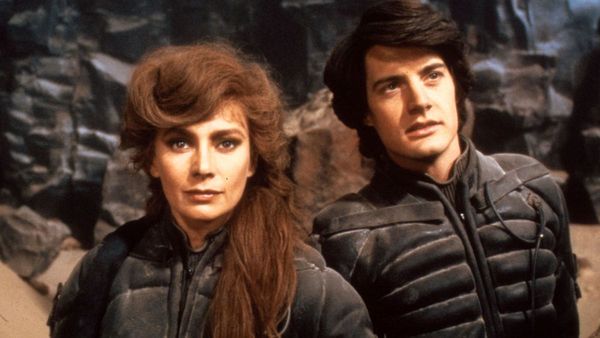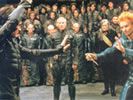Eye For Film >> Movies >> Dune (1984) Film Review
Dune
Reviewed by: Jennie Kermode

Due to its complex world building, its vivid characters and its mythic scope, Dune has become one of the most famous science fiction books in history despite the fact that, strictly speaking, there's very little science fiction in it. It's pure space opera, set among warring dynasties and focused on the control of a powerful drug which holds the secret to interstellar travel - yet that's not to disdain it, and indeed it has millions of fans. So how did the combination of this celebrated material with a director as capable as David Lynch manage to produce a famous disaster?
The key, Lynch tells us, is in the editing. He was denied the control he needed to develop his singular vision. Yet the director's cut, when it eventually happened, also attracted plenty of criticism. The truth is that the film isn't really that bad - it certainly has its impressive moments - but it simply couldn't live up to the hype and it was doomed, like several of its characters, by its own ambition.

At the centre of the story is Paul, a teenage boy whose heredity has gifted him with visions of the future. These could save his life and change the future of the known universe, yet they also help to make him a fugitive, on the run from a power-hungry emperor and his family's longstanding enemy, the Baron Harkonnen. Kyle MacLachlan is too old for the part and his mannered style, so charming in Twin Peaks, resonates awkwardly with the character's moody nature. As his mother Jessica, a highly skilled warrior-courtesan, Francesca Annes is even worse, hopelessly wet and continually seeking male protection. Yet with the supporting characters the film scores a few hits.
It's a strong cast. Jürgen Prochnow is convincing as Paul's father, the complex duke for love of whom Jessica betrayed her own people. Richard Jordan makes a suitably heroic Duncan Idaho, Paul's right hand man, and Linda Hunt is divine as the peculiar Shadout Mapes ("the House Keeper"). Fans of Patrick Stewart will be pleased to note his appearance among the Duke's men and, of course, there are Lynch regulars like Jack Nance who can always be relied upon to add character. Meanwhile, Kenneth McMillan plays a grotesque Baron Harkonnen, pure pantomime but unforgettable nonetheless, stealing his scenes like Alan Rickman in the equally troubled Robin Hood: Prince Of Thieves.
Beyond the problems with central roles, the film's real trouble stems from the fact that Lynch just wasn't the right man for the job. Dune is a complex, multi-layered tale, and he has approached it from a very particular perspective, focusing narrowly on the strangeness of Paul's visions, the effects of the drug and the mystical style of fighting developed by the native desert people (ignoring the book's suggestion that their main advantage was the toughness gained from living in a harsh environment). Thus distorted, the story simply can't bear its own weight. Once important scenes come to seem irrelevant and much of the logic of character development is lost.
There are giant sandworms of course, and they're still pretty impressive, but their metaphorical relevance doesn't quite hit home - human characters exhibit cartoon monstrousness rather than hinting at the darkness present in each one of us. A silly battle near the end, with Sting in his underwear, doesn't help proceedings, and far too much emphasis is given to Virginia Madsen's narrator (another drippy female character) as the woman whom Paul is destined to marry but never love. It feels almost like an apology for the book's more complex approach to family, fitting better with its much weaker sequels. What we get, in the end, is a good enough late night monsters and fighting film - the tragedy is that it could have been so much more.
Reviewed on: 12 Dec 2009

















